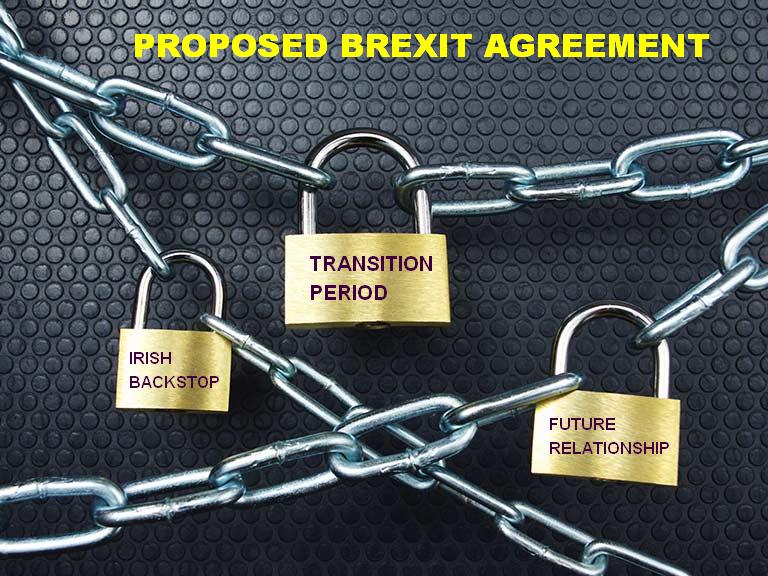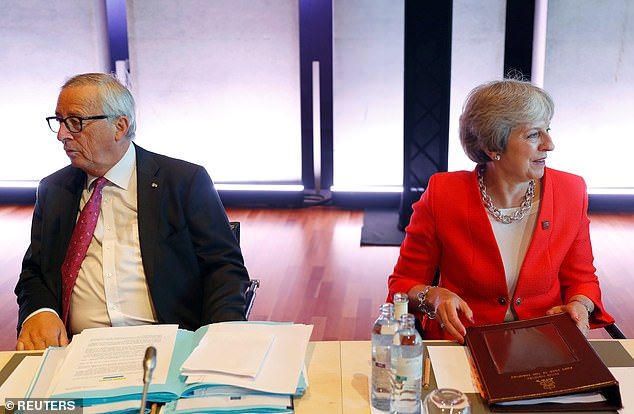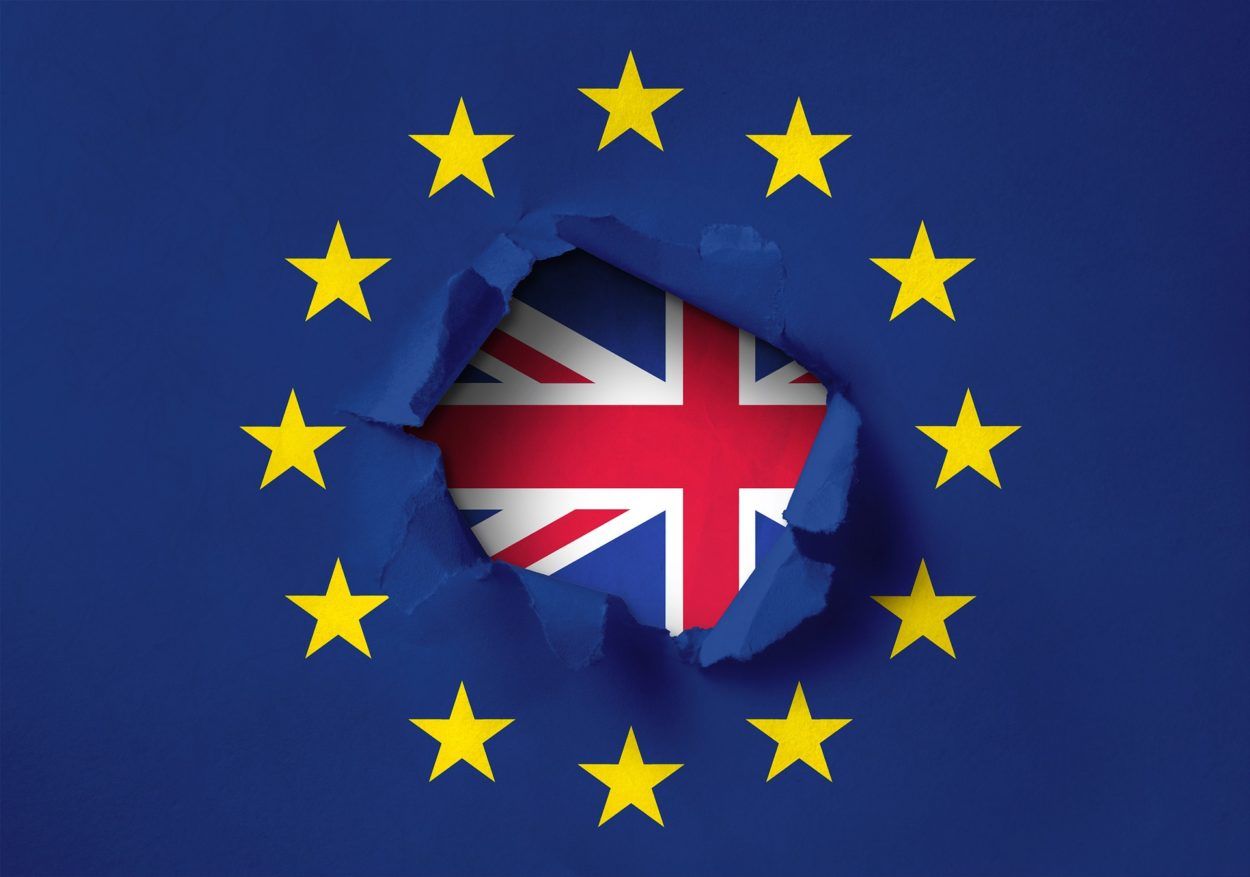This Brexit deal creates a triple lock to shackle the UK to Brussels forever

Written by - A Civil Servant - The author is a serving Civil Servant whose anonymity we are protecting.
Just as we thought the orchestrated fog of confusion around the Withdrawal Agreement was about to lift, there were reports that Theresa May might even postpone the meaningful vote again while she seeks “reassurance” from the EU about the Northern Ireland backstop.
Whatever fudge is cooked up in Brussels to try to bolster support for her “deal”, it is very unlikely that the EU will delete the backstop. Why? Because it is a crucial element of the Withdrawal Agreement’s “triple lock” structure designed to stop Brexit. “Withdrawal Agreement” is an Orwellian misnomer, of course. This agreement keeps Britain in chains.
Voters may believe we need it in order to leave the EU. We do not. They could be fooled by the Prime Minister’s repeated claims that there might be “no Brexit” unless it is passed – when of course Brexit will happen by default without it under the terms of the European Union (Withdrawal) Act. Voters might also be forgiven for believing that the Withdrawal Agreement settles our future trade relationship with the EU. Not in the slightest. Future trade talks remain just that – in the future – while May’s “deal” keeps the UK legally shackled to a moribund EU economy which it must attempt to revive with vast sums of British taxpayers’ money for an indeterminate number of years.
Project Fear has been in overdrive since the Withdrawal Agreement was published, with spin, misrepresentation and blatant untruths deployed to sell it to a rightly suspicious nation. But once people open the Withdrawal Agreement tin, they seem more inclined to spit out its contents than swallow them whole. It’s rather like buying a can labelled “tomato soup” and finding it contains a concoction of deadly nightshade.
But credit where it’s due: EU officials (ably abetted by their British allies) have produced a devilishly clever draft treaty which, if passed, would end Brexit and get Britain ready to board the express train to a United States of Europe. The political takeover of the UK represented by the Withdrawal Agreement is an audacious attempt to reverse a damning popular vote of discontent with the European Project and provide fresh impetus for the federal superstate that is the EU’s raison d’être.
The EU’s triple lock guarantee is so constructed that never again will Brussels be troubled by an explosion of democracy in the United Kingdom. Parliament has one last chance to escape total eclipse – and it is now, by rejecting the Withdrawal Agreement in its entirety.

The first lock: the transition period
The first lock is the transition period, which lasts until at least 2021. We must hand over an estimated £39 billion for nothing, be bound by EU law and take orders from an unelected Joint Committee operating under the jurisdiction of the European Court of Justice. Will the EU27 agree an equitable free trade agreement before the end of 2020? Unlikely, since all the goodies they want in the “future partnership” are set out in the Northern Ireland backstop, which kicks in automatically on 1st January 2021 unless superseded by a “partnership” agreement. Full ratification by all Member States is required before any such agreement can come into force. Achieving this in time to avoid entering the backstop would be nothing short of miraculous, even if the EU agrees to extend the transition period for one or two years. So it is more pay with no say and a likely doubling of the Brexit bill to £80 billion, to be paid with no reference to British MPs.
The second lock: the backstop
The backstop is intended to be inescapable. It prepares Britain for the final destination set out in the political declaration, as a permanent satellite state of the EU. By which time, of course, it is doubtless hoped that we will be so fed up with our vassalage that we decide to rejoin the EU as a full member – with greatly increased budget contributions and a whole swathe of new EU law to obey. The United States of Europe will have taken shape during our “wilderness years” using our money (“Britgeld” seems to be an appropriate term), but without our political input. No taxation without representation? What a joke.
Not only does the backstop carve out Northern Ireland as an EU province and set a border in the Irish Sea, it creates a partial “customs union” that requires us to implement EU trade tariffs and policy with no decision-making powers. Under highly restrictive “non-regression clauses”, the UK also agrees to implement all EU environmental, competition, state aid and tax harmonisation laws, with the unelected Joint Committee and the ECJ once again able to punish us for any perceived backsliding. British farmers will be locked into a subsidy regime well below support received by EU27 farmers, who nevertheless retain tariff-free access to the UK. British agriculture would be decimated. It means we could not support British businesses, give ourselves a competitive edge in new technologies where we excel, strike independent trade deals or diverge in key policy areas such as goods regulations and tax. Free EU access to UK fisheries is set down as a marker for negotiation in the future “deal”.
The third lock: the “future partnership”
Anyone expecting the EU27 to give up the immense advantages they gain under the backstop is delusional. Retaining tariff-free access to the UK market and effective control of UK trade and competition policy must be nirvana for them. To ensure they reap the full benefit, there is the third and final lock in the Withdrawal Agreement. Unless we agree to a “future partnership” as set out in the political declaration, the backstop will endure in perpetuity.
The Political Declaration replicates all the onerous “non-regression” clauses of the backstop and requires even more surrender of sovereignty via participation in and funding of the EU’s aerospace and defence programmes, free access to UK waters for EU fishermen, a full customs union and common trade policy, free movement by the backdoor under “mobility” clauses, EU control of UK agriculture via the state aid rules and in general full adherence to the acquis communautaire in all policy areas.
Thank you for your triple lock guarantee, M. Barnier. The Withdrawal Agreement cage conforms to the highest EU safety standards.
But could I have my Sovereign Tomato Soup now, please?
CONTINUATION

Written by A Civil Servant - February 20, 2019 - The author is a serving Civil Servant whose anonymity we are protecting.
The Political Declaration is not a vague wish list, but an attempt to bind the UK to EU policies
The Political Declaration accompanying the draft Withdrawal Agreement has been largely overlooked in the furore over the backstop and the resounding defeat at the meaningful vote on 16th January 2019. However, the letter written to the Prime Minister by Jean-Claude Juncker and Donald Tusk on 15th January confirms that:
a) “There is an important link between the Withdrawal Agreement and the Political Declaration, reflecting Article 50 of the Treaty on European Union. As stated in Article 184 of the Withdrawal Agreement and reflected also in Paragraph 138 of the Political Declaration, the European Union and the United Kingdom have committed to use best endeavours, in good faith and in full respect of their respective legal orders, to take necessary steps to negotiate expeditiously the agreements governing their future relationship referred to in the Political Declaration.”
b) “As for the link between the Withdrawal Agreement and the Political Declaration, to which you make reference in your letter, it can be made clear that these two documents, while being of a different nature, are part of the same negotiated package. In order to underline the close relationship between the two texts, they can be published side by side in the Official Journal in a manner reflecting the link between the two as provided for in Article 50 of the Treaty on European Union (TEU).”
It is therefore unwise to dismiss the Political Declaration as a “vague wish-list”. It is far from vague and binds the UK into most areas of EU policy (in many cases under EU law); and should any form of the current draft Withdrawal Agreement pass a second meaningful vote, this Political Declaration will undoubtedly form the basis for the future relationship.
The EU’s letter of 15th January did not include any legal text to make the backstop either optional or time-limited. It is unlikely that concessions will be offered on the backstop for the simple reason that it is required to compel the UK to follow both the timing and substance of the negotiations envisaged in the Political Declaration.
The following is a summary of my more detailed paragraph-by-paragraph analysis of the Political Declaration which you can see here.
General principles
- The preamble confirms the link to the Withdrawal Agreement. It commits the UK to “an ambitious, broad, deep and flexible partnership across trade and economic cooperation, law enforcement and criminal justice, foreign policy, security and defence and wider areas of cooperation.” Hard red lines are set by the EU with regard to an agreement consistent with “the Union’s principles” and rules, meaning that in most important areas, EU law will be supreme.
Core values and rights
- The UK will have to agree to EU human rights law “as an essential prerequisite” to trade talks.
Data protection
- The EU has placed assessment of UK databases, including the transfer of the personal data of UK citizens, first on the list of areas of cooperation.
Participation in Union programmes
- Participation in a wide range of EU programmes across science, culture, overseas development, defence, foreign policy and space is to be subject to EU law and requires a financial contribution from the UK to be determined by the EU.
- The UK commits to funding a shared PEACE PLUS programme in Northern Ireland and to exploring options to rejoin the European Investment Bank.
Economic partnership
- The economic partnership requires inclusion of the onerous non-regression clauses in Annex 4 of the backstop.
- A free trade area is proposed across all sectors with a customs union (“build and improve on the single customs territory provided for in the Withdrawal Agreement”) – i.e. in the backstop, where the UK must implement the EU’s common external tariff in full. This means the UK will not be able to operate an independent trade policy, despite statements to the contrary.
- The UK should adopt EU rules for goods (with no say) with full regulatory alignment.
Customs and the Irish border
- Paras 26-27 propose facilitative customs arrangements covering technology and administrative cooperation (trusted trader schemes, electronic declarations etc) to avoid a hard border in Ireland.
- The EU therefore admits in the Political Declaration that there is no need for the backstop or a customs union to avoid a hard border in Ireland.
Services and investment
- The economic partnership covers all areas of services, with regulatory alignment.
- There is a risk of a supranational regulatory body through “structured cooperation” in financial regulation.
Public procurement
- Public procurement to go beyond WTO GPA commitments and will favour state-owned EU businesses.
Mobility
- Mobility provisions retain the prospect of preferential treatment for EU nationals, including access to social security benefits and some form of free movement (making it easier to cross borders).
Transport
- The EU seeks comprehensive agreements in the transport sector, particularly aviation, with the imposition of EU policies on standards (including working hours etc), although international agreements and bilateral arrangements with the EU27 could adequately cover this sector.
Energy
- The UK is expected to rejoin/align with the EU’s carbon pricing scheme. Any clauses linked to climate change will be enforced as part of the overall deal (France has already said it will veto trade deals with countries it deems non-compliant with environmental targets, particularly with those set out in the Paris Agreement).
Fishing
- Fishing is surrendered as a shared resource, with an agreement on quotas, management of stocks and continued EU free access to UK waters to be ratified by 1st July 2020. And should we enter the backstop, we will not be allowed to leave it unless we sign a fisheries agreement with the EU as set out in this linked Political Declaration.
Competition and “level playing field”
- Catch all to force UK alignment with EU rules on “state aid, competition, social and employment standards, environmental standards, climate change, and relevant tax matters, building on the level playing field arrangements provided for in the Withdrawal Agreement” (i.e. replicating the “non-regression” clauses in the backstop). Could be used to trap us in the backstop.
Agriculture
- State aid provisions will allow the EU to influence the level of support available to British farmers, already set at a very disadvantageous level in the Withdrawal Agreement.
Security partnership
- Extensive provisions to lock the UK into the EU’s legal and judicial pillars through the criminal justice system, with operational activities and data exchange under EU rules. Obliges the UK to arrest people (including our own nationals) deemed to have committed “political offences”.
Foreign policy, intelligence and defence
- Ties the UK into the EU’s Common Foreign and Security Policy, commits the UK to common action with EU in international forums, joint military action under EU command structures, participation in and funding of EU defence agencies, operations under EU control.
- Defence manufacturing and procurement to be under EU frameworks. Intelligence sharing under EU frameworks.
- UK to consider continued funding the EU overseas aid budget under EU rules.
- Taken together, the provisions on foreign policy, defence, intelligence and cyber security mean that UK assets and know-how will be used to further the EU’s strategic objectives – a serious risk to national security, defence capability and existing international alliances.
- UK to participate in EU’s civil protection mechanism as “a participating state” – could lead to UK being asked to fund a Eurozone bailout, as in the past.
Institutional framework
- Envisages associate membership of the EU via a formalised “institutional framework”.
- Replicates the Joint Committee provisions of the Withdrawal Agreement with all questions of EU law (of which there will be many in view of the above) to be referred to the ECJ for a binding ruling. No international dispute mechanism at the WTO, for example.
Negotiations and timetable
- Power to start negotiations rests solely with the EU. Once the WA is ratified, the EU can take as long as it likes to start talks and string them out for as long as it wants. As the UK will be locked either into a transition period or the backstop, it can only influence progress by agreeing to the EU’s terms. The UK has already surrendered its leverage in the negotiations.
- Progress to be benchmarked to steps to remove the need for a hard border in Ireland. This establishes a direct link between leaving the backstop and agreeing a deal, thus reinforcing the fact that most of this declaration (all “should”, “must”, “will” not “may” or “might”) is already non-negotiable.
- There is no cut off point if agreement cannot be reached. A six-monthly review of talks does not suggest that progress will be anything.
The anonymous civil servant’s fully detailed analysis of the Political Declaration can be viewed by clicking here.
WHO and WHAT is behind it all ? : >
The bottom line is for the people to regain their original, moral principles, which have intentionally been watered out over the past generations by our press, TV, and other media owned by the Illuminati/Bilderberger Group, corrupting our morals by making misbehavior acceptable to our society. Only in this way shall we conquer this oncoming wave of evil.
Commentary:
Administrator
HUMAN SYNTHESIS
All articles contained in Human-Synthesis are freely available and collected from the Internet. The interpretation of the contents is left to the readers and do not necessarily represent the views of the Administrator. Disclaimer: The contents of this article are of sole responsibility of the author(s). Human-Synthesis will not be responsible for any inaccurate or incorrect statement in this article. Human-Synthesis grants permission to cross-post original Human-Synthesis articles on community internet sites as long as the text & title are not modified.
The source and the author's copyright must be displayed. For publication of Human-Synthesis articles in print or other forms including commercial internet sites. Human-Synthesis contains copyrighted material the use of which has not always been specifically authorized by the copyright owner. We are making such material available to our readers under the provisions of "fair use" in an effort to advance a better understanding of political, economic and social issues. The material on this site is distributed without profit to those who have expressed a prior interest in receiving it for research and educational purposes. If you wish to use copyrighted material for purposes other than "fair use" you must request permission from the copyright owner.
TILBAKE TIL HOVEDMENYEN - BACK TO THE MAIN MENU